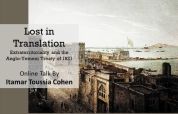
In 1821, an expeditionary force of the Bombay Marine imposed an unequal treaty upon the Imam of Sana‘a, sovereign of the Yemeni port of Mocha. Previous accounts, depicting the incident as a standard rehearsal of British gunboat diplomacy, have overlooked an important legal innovation enfolded in the treaty where in the East India Company claimed jurisdiction not only over Britons and other dependents, but over the entire Indian merchant population of the port. The stakes of the Company ’s claim extended well beyond defending the interests of British protected subjects: rather, the incorporation of Indian merchants into the imperial fold was envisaged to facilitate Britain’s legal penetration and extraterritorial entrenchment in Arabia. Prosaically enough, however, the intervention was foiled by an inaccurate translation of the treaty from English to Arabic, demonstrating the extent to which Company officials were at the mercy of non-Western middlemen and translators who brokered between the mand local rulers and administrators. A second line of inquiry in this talk thus looks at the structural vulnerabilities of legal imperialism, reflecting upon the potential of contradictions and untranslatabilities between British-imperial and Arab-Islamic legal and epistemological assumptions in shaping the outcomes of the imperial encounter in the western Indian Ocean.